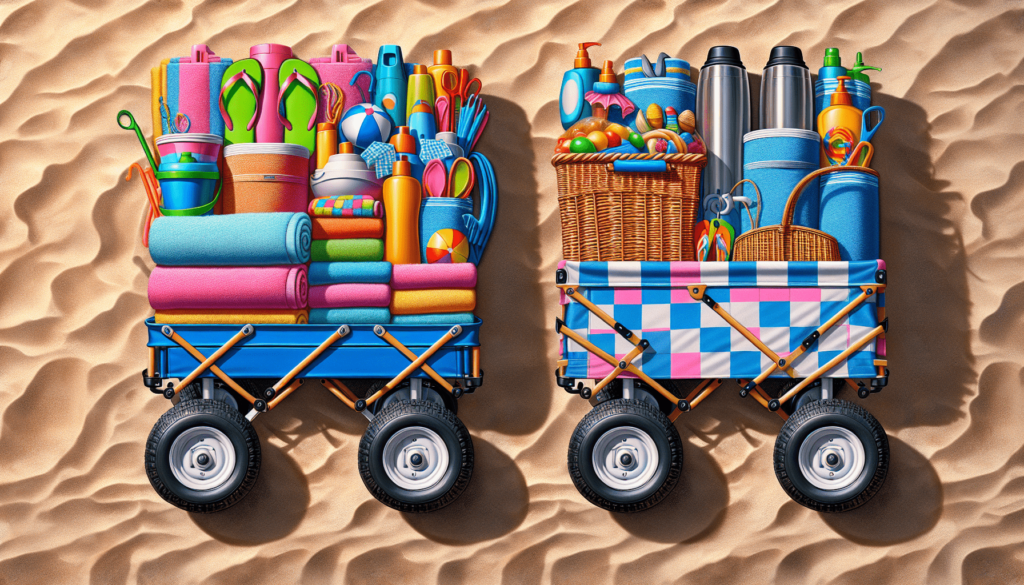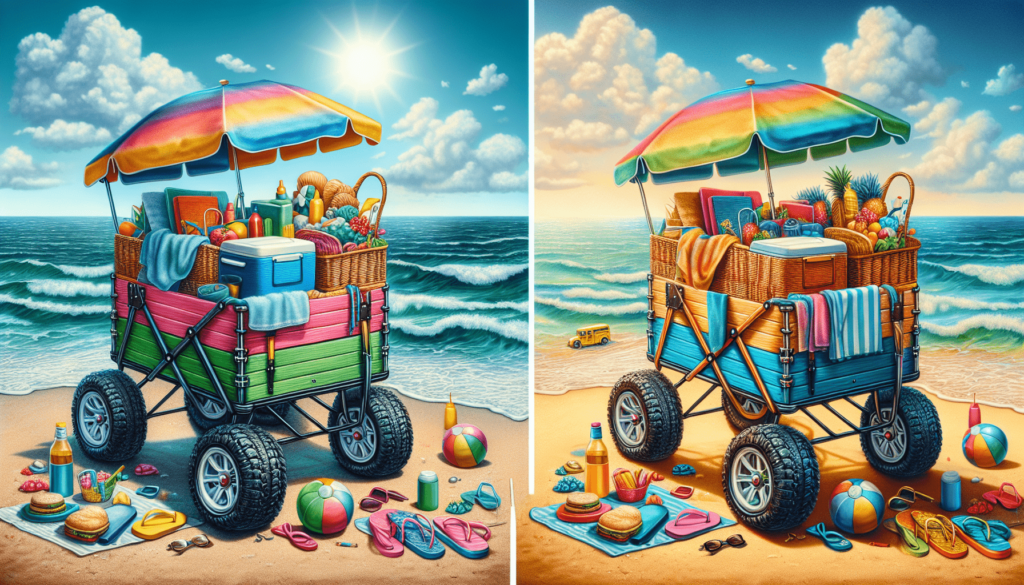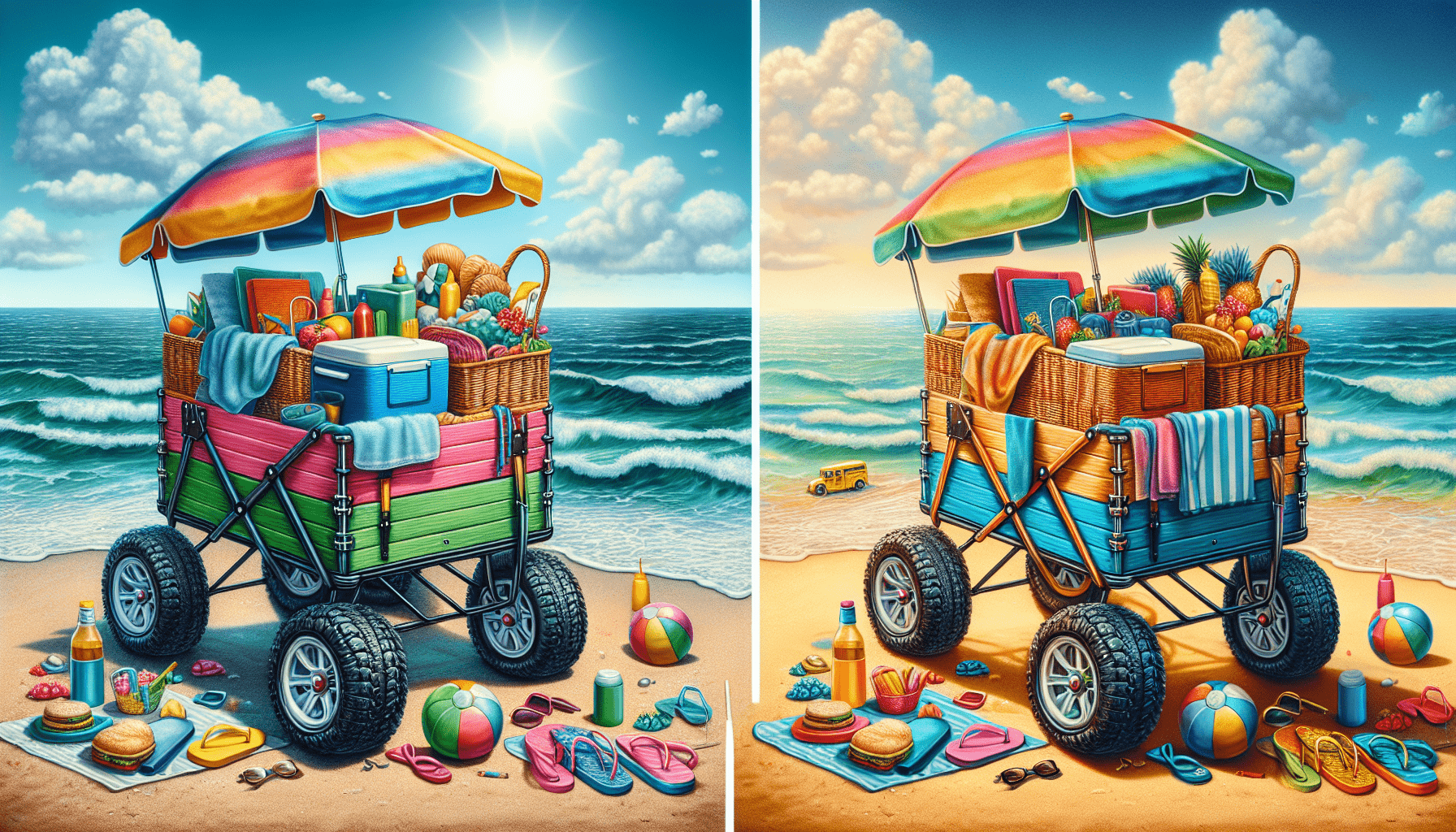Have you ever found yourself questioning the differences between a beach wagon and a standard folding wagon? You’re not alone! With so many options available, it can be a bit confusing to decide on the best one for your needs. Both types of wagons have their own unique features, benefits, and ideal uses. Let’s break down the details so you can make an informed choice for your next outdoor adventure.

Understanding Wagons
Wagons come in all shapes, sizes, and designs. They’re versatile tools that can make transporting items easier, whether you’re headed to the beach, a picnic, or a local park. Understanding the fundamental functions will help clarify the distinction between these two popular types.
The Basics
A wagon typically consists of a sturdy frame with wheels and a handle, designed to carry heavy or bulky items. The main difference between a beach wagon and a standard folding wagon lies in their intended use and the specific features tailored to those uses.
Beach Wagon: A Closer Look
Beach wagons are specifically designed for trips to the seaside. They come with a variety of features suited for sand, sun, and surf. Here’s what you need to know:
Design and Structure
Beach wagons generally have larger, wider wheels. These wheels are made to glide over sand, rather than get stuck, allowing you to move your gear with ease. The materials often include weather-resistant fabrics that can endure sun exposure, saltwater, and sand.
Key Features
| Feature | Description |
|---|---|
| Wheel Size | Larger wheels designed to handle sandy terrain |
| Weight Capacity | Can hold heavy items like coolers, beach chairs, and toys |
| Durability | Made from weather-resistant materials to withstand the elements |
| Storage | Often includes additional pockets for smaller items |
| Utility | Designed for sand and rough terrain |
Ideal Uses
You might consider a beach wagon for trips involving:
- Beach outings with family.
- Carrying kids’ toys, umbrellas, chairs, and beach games.
- Transporting food and beverages for picnics on the shore.
Standard Folding Wagon: A Comprehensive Overview
Whereas beach wagons are specialized for sandy beaches, standard folding wagons are incredibly versatile and suitable for a variety of environments. Let’s take a deeper look into their features and advantages.
Design and Structure
Standard folding wagons are more lightweight than beach wagons. They often feature a collapsible design, making them easy to store and transport. The wheels are usually smaller, which aids in maneuverability on hard surfaces like sidewalks and grassy areas.
Key Features
| Feature | Description |
|---|---|
| Wheel Size | Generally smaller, suitable for paved or grassy terrains |
| Weight Capacity | Varies, generally capable of carrying moderate loads |
| Durability | Made from durable materials but may not be as weather-resistant |
| Storage | Typically includes a spacious interior, with fewer pockets |
| Utility | Suitable for urban settings, parks, and sporting events |
Ideal Uses
A standard folding wagon may be perfect for:
- Family outings in parks or community events.
- Shopping trips where you need to carry multiple items.
- Transporting gear for sports, festivals, or farmers’ markets.

Comparing Use Cases
Weather Resistance
While both wagons can be durable, beach wagons are typically built to withstand harsher conditions, such as saltwater and direct sunlight. If your activities regularly involve such environments, a beach wagon might be more suitable.
Maneuverability
In environments with uneven surfaces like sandy beaches, the larger wheels of beach wagons make mobility easier. Conversely, standard folding wagons excel on even surfaces, like sidewalks or grassy park areas.
Capacity Limitations
Beach wagons often have a higher weight capacity, designed for larger gear like coolers and beach chairs. On the other hand, standard folding wagons are great for general carry but might not accommodate larger items as easily.
Factors to Consider When Choosing a Wagon
Choosing the right wagon for your needs involves several factors. Let’s discuss a few considerations before making your purchase.
Purpose of Use
Begin with your primary use case. Are you planning beach outings, trips to the park, or maybe a little of both? Understanding how you’ll utilize your wagon will help inform the best choice.
Terrain Considerations
Think about the types of terrains you’ll be navigating. For sandy beaches, go for a beach wagon with larger wheels. If your routes are primarily paved or grassy, a standard folding wagon may serve you better.
Weight and Portability
If you plan to travel often with your wagon, portability becomes essential. A folding wagon is easier to store and carry if you have limited space in your vehicle or home.
Additional Features
Consider the features that are important to you, such as:
- Cup holders.
- Pocket storage.
- Sunshade canopies.
Choosing additional features can enhance your experience and better meet your specific needs.
Pricing Insights
You might be wondering how these two types of wagons stack up in terms of cost. Here’s a general overview:
| Wagon Type | Average Cost Range |
|---|---|
| Beach Wagon | $100 – $300 |
| Standard Folding | $50 – $200 |
While prices can vary widely based on the brand, features, and materials, keep in mind that investing a bit more in high-quality wagons can pay off in comfort, usability, and durability in the long run.
Maintenance Tips
Once you’ve chosen your wagon, it’s essential to keep it in top shape. Regular maintenance extends your wagon’s life and keeps it performing well.
Cleaning
For both wagon types, regular cleaning is a must, especially after beach outings. Sand and salt can lead to wear and tear if left unattended. Here are a few tips:
- Rinse down the frame and wheels after use, especially if you’ve been at the beach.
- Wipe down fabric areas with a damp cloth; use mild soap if needed.
- Always allow your wagon to dry completely before storing it to prevent mold and mildew.
Inspect Regularly
Check the wheels, frame, and fabric for any signs of damage or wear. Replace any worn parts promptly to maintain functionality. This simple practice can save you from larger repair costs down the line.
Frequently Asked Questions
You might have a few lingering questions about your wagon-buying journey. Let’s tackle them!
Can I Use a Beach Wagon on Paved Roads?
Yes, you certainly can! While beach wagons are optimized for sand, they can navigate paved roads with ease as well. Just be aware that the larger wheels, although beneficial on sand, may not provide the most stable experience on smooth surfaces.
Are Standard Folding Wagons Waterproof?
Most standard folding wagons are not fully waterproof. However, some come with waterproof bottoms which offer a degree of protection against spills or moisture. If you anticipate wet conditions, consider this feature.
Can I Perform Heavy-duty Tasks with a Standard Folding Wagon?
While standard folding wagons can handle a fair amount of weight, they’re not designed for heavy-duty situations. If you’re planning to haul very heavy items regularly, a beach wagon or a heavy-duty outdoor wagon may be the better choice.
How Do I Fold My Wagon?
Folding mechanisms vary by brand, but most standard folding wagons have a simple pull-and-release mechanism. Beach wagons may require a few more steps, so refer to the user manual for your specific model.
Conclusion
In the end, choosing between a beach wagon and a standard folding wagon boils down to your needs and lifestyle. If beach outings are a regular part of your routine, investing in a beach wagon will likely serve you well. On the other hand, if versatility is what you seek, a standard folding wagon could meet your expectations perfectly.
By taking the time to evaluate your requirements based on terrain, capacity, and purpose, you can confidently make a decision that suits your outdoor lifestyle. Happy wagon hunting! Whether you’re hitting the beach or heading to a park, the right wagon can truly enhance your experience. So, grab your gear, load it up, and get ready for your next adventure!

